Last February, a Silicon Valley émigré named Joe Lonsdale looked out the window of his Austin office and did not like what he saw.
There on the lawn of the exquisitely restored mission-style building that housed the Cicero Institute, a public policy nonprofit Lonsdale had founded to “fix broken public systems” and to “preserve the promise of American liberty for generations to come,” were a lot of people who did not seem to be on the same page.
It was a cool, brisk day, and the group of fifty or so flattening Cicero’s grass were dressed in knit caps, T-shirts, and hoodies. They were protesting Lonsdale’s push, locally and nationally, to sweep the homeless off the streets by ticketing or jailing those camping on city thoroughfares. As Lonsdale had made the homeless a target, so this group had now targeted him: a very wealthy white man of the political right who had come from California and was dead set on persuading the city of Austin to see things his way. He wasn’t subtle. Lonsdale had shelled out for billboards that featured his face on the left, a cowboy hat on the right, and in between, the words “Freedom. Honor. Growth.” And “Lonsdale & Cicero Institute Fight for Texas.”
As can happen, Lonsdale’s notion of freedom was colliding with that of the protesters. “Cicero Profits off Pain,” read signs printed in red on black. “Poverty Is NOT a Moral Failing,” read a handmade poster. The sign directly adjacent declared that “Billionaires Shouldn’t Exist.” A few protesters used megaphones to express their fervent opinion that Cicero’s policies amounted to criminalizing the homeless, something they accused Cicero of advocating for across the country. “Joe Lonsdale and the Cicero Institute, the victims of Cicero see through your lies!” a woman with a bullhorn cried. As she spoke, the group began a slow surge toward the porch, chanting, shaking their posters, and demanding that Cicero staffers come outside and hear them out.
No one emerged from the beautiful brick mansion, least of all Lonsdale. A youthful, restless 43, Lonsdale doesn’t look like the typical tech billionaire. Unlike some of his friends, he dresses conservatively in understated but expensive VC casual and is impeccably groomed—his reddish hair neatly swept back from his boyish face and his beard closely cropped. He possesses a clear, blue-eyed gaze that gets focused when he is engaged and tends to roam when he’s impatient or uncomfortable. He has a slight stutter that gives him an aura of self-deprecation. But he speaks, almost always, at a velocity approaching the speed of sound.
Cicero’s founder made Austin his home in 2020 after becoming one of the most influential voices in Silicon Valley. A disciple of libertarian billionaire Peter Thiel, he launched his career with a college internship at PayPal, which was cofounded by Thiel and was where Lonsdale came in contact with Elon Musk. After graduating from Stanford, Lonsdale worked at Thiel’s hedge fund, Clarium Capital. Then, in the early aughts, the two men founded the data mining and defense-tech company Palantir.
As his fortune grew, Lonsdale, like Musk, became deeply disenchanted with California. Announcing his move to Texas in a Wall Street Journal op-ed, he explained that California’s political leadership had crushed the state’s entrepreneurial spirit and that its cities were awash in crime, thanks to ill-conceived criminal-justice reforms and “radical district attorneys.” “We grew weary of California’s intolerant left,” Lonsdale wrote, “which would rather demonize opponents than discuss honest differences of opinion.” The solution to all these problems was obvious, if, of course, you had the vision. “We’re betting that the future of America is going to be built in the middle of the country, in places with good government and a reasonable cost of living,” he wrote. “In other words, places like Texas.”
Lonsdale believed Austin had the potential to leave Silicon Valley in the dust. Regulatory red tape would be cut to shreds so that new businesses could thrive. Innovation would explode: Austin would become a center for AI companies, cancer curing, longevity-hacking biotech labs, and firms developing new weapons systems that would make America safe again.
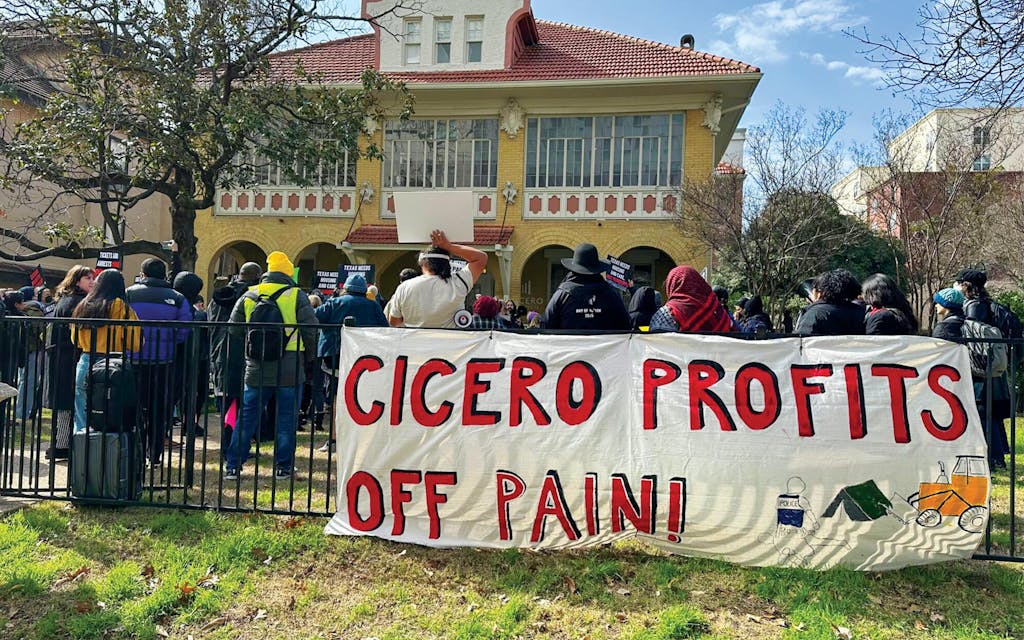
 A protest at the Cicero Institute’s headquarters in February.Courtesy of VOCAL-TX
A protest at the Cicero Institute’s headquarters in February.Courtesy of VOCAL-TX
But five years into his life in Austin, Lonsdale was realizing that he had fled the catastrophes of California only to find them replicated here, in Texas’s Democratic capital city—the place former Governor Rick Perry once called the blueberry in Texas’s tomato soup. Maybe, in his desperation to leave California behind, Lonsdale hadn’t anticipated that locals on Austin’s left, of which there were so many, would come to view him as an archvillain of the Silicon Valley migration—as much as or even more so than Musk.
But Lonsdale is not the kind of guy to cut and run. He has an unshakable belief in the work he is doing to make Austin better for everyone. “A lot of us are trying to just be good citizens and leaders and keep things functional,” he told me. “And part of that is going to be figuring out how to confront the people who are causing a problem.”
Instead of following his own advice last February—that is, to engage in a discussion of “honest differences of opinion”—he took to X to speak to his more than 200,000 followers, posting a photo of the protesters above a combative caption. “Today at @Institute Cicero Office: multiple buses of protesters, trespassing, yelling w/ megaphones, and banging on windows, to try to stop our homeless reform work. To be clear: we won’t be intimidated. Their tactics are designed to stop anyone from standing up against NGOs.”
Even Thiel encouraged him to fight on. Appearing on Lonsdale’s American Optimist YouTube talk show, he told his protégé, “If Austin can be fixed, you will be the one to fix it.”
But like many newcomers from California, Lonsdale was discovering that Austin did not want to be fixed.
No city has done bereavement better than Austin. For many old-timers, grieving Old Austin—a paradise lost—has become a pastime. The place even bests San Antonio in its resolute attachment to a comparatively recent past, one that is often tied to when the bereaved went into exile after graduating from the University of Texas. No fewer than three valedictory books have been published in the last two decades on the subject of the city’s supposed descent from liberal heaven to tech-bro hell.
But the most recent eulogizing is not just a function of nostalgia. During the pandemic, California’s tech leaders got the idea that Texas in general and Austin in particular could provide a workable alternative to their declining state. At the turn of the decade, coders, venture capitalists, crypto bros, web developers, and inventors packed up and headed to the Texas capital, drawn by the dream of a reverse gold rush, with new fortunes and a bold new future to be made from new technologies. They came to work at Oracle, which moved its headquarters here in 2020. They came for Tesla, which relocated in 2021. They came for Apple and Facebook. The population of the city rose by almost 11 percent between 2020 and 2024, and while a lot of the transplants weren’t in Musk and Lonsdale’s tax bracket, they still looked like high-end earners to the Census Bureau. Between 2020 and 2021 the median household income in Travis County grew by 12.5 percent.
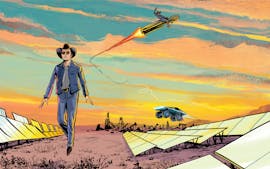 Elon Musk Came to Texas to End the Oil Age
Elon Musk Came to Texas to End the Oil Age
To ambitious, visionary moguls—who maybe never checked Austin’s August and September temperatures—the Texas capital made a lot of sense. Tech titans had been souring on the Democrats since the late 2010s, angered by their tightening of the regulatory noose. Meanwhile, the city was blooming with the kinds of opportunities that had made so many so rich in Silicon Valley: government contracts as tech began to change virtually everything in the modern world, including health care, education, finance, and, particularly, the extremely lucrative arena of defense, which greatly expanded in Austin with the arrival in 2018 of the Army Futures Command. While California was locking down during the pandemic, our state government couldn’t roll out the welcome mat fast enough for the likes of Musk, Lonsdale, and a posse of friends, associates, and hangers-on. Faster openings of businesses! Fewer regulations mandating remote work! A governor who seemed to spend every waking minute scheming to own the libs—and probably dreamed of it too!
Almost overnight—or so it seemed, at least—the city had a new group of players whose names were virtually unknown to the average Austinite, much less to the average Texan. Along with Musk and Lonsdale, there were housing-policy advocate Nicole Nosek and her husband, Luke—the PayPal cofounder and Space X investor who, with his partner, Stephen Oskoui, runs the venture capital firm Gigafund. Also gone to Austin was Joe Gebbia, the cofounder of Airbnb, who earlier this year pitched in with Musk at DOGE to ostensibly streamline some rickety old government systems. Matt Michelsen, a venture capitalist with an upstart disaster and migrant-detention logistics firm, fled California for Austin at around the same time.
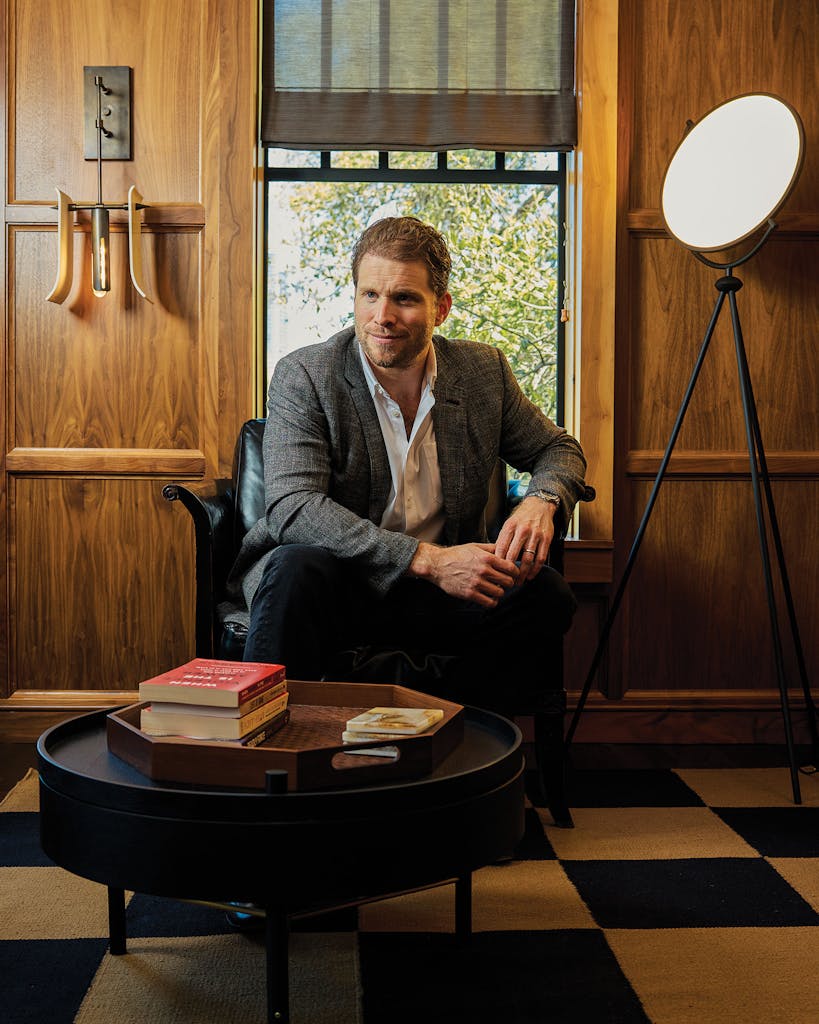
 Joe Lonsdale at the 8VC offices in Austin.Dave Creaney
Joe Lonsdale at the 8VC offices in Austin.Dave Creaney
These newcomers were nothing like typical Austinites, and not only because their wealth dwarfed that of just about everyone else in town. Mostly, they gravitated toward enormous faux Italian villas on the lake or built sprawling, contemporary glass-and-concrete bunker-like structures high up in the hills with the best water views. They kept to themselves, partly because people who are that wealthy tend to be that way and partly because they already had their affinity group from California. They also shared the same politics, in large part. Like Gebbia, Musk, and Nicole Nosek, many are former Democrats who have replatformed as Republicans. Many are also protégés of Thiel, the country’s most brilliant thinker or the country’s most dangerous techno-fascist, depending on your politics. To Thiel, who warns that the Antichrist is coming, wokeness is weakness; the hoi polloi are not to be trusted. As he famously wrote in an essay for the right-wing Cato Institute, “I no longer believe that freedom and democracy are compatible.”
If in the old Austin, libertarians would have been laughed out of town, that is no longer the case. On a blustery day last winter, for instance, I attended a gathering at Arena Hall, a membership-driven nonprofit networking venue that is sort of a Silicon Valley dupe. It hosts frequent events and programs, styling itself as a center for thought-leaders-to-be. Techies were once known for being antisocial, but they seem to have gotten over it.
Located in a refurbished, whitewashed mini manse west of the UT campus, Arena Hall features a robber baron aesthetic inside. There are richly paneled walls, bookcases with actual books, and a worn, creaky grand staircase where you’d expect to see the ghost of J. P. Morgan descending in velvet slippers and a smoking jacket.
Founded by Ivy Leaguer, self-help author, and venture capitalist Evan Baehr in 2022, Arena Hall describes itself on its website as “a force for flourishing” and “a collective of like-hearted leaders in Austin collaborat[ing] through friendship to initiate and propel critical projects for the betterment of our city, state, and nation.” Baehr says he’s “trying to build a third space that brings together both Austin’s old guard and the large new population arriving from cities like L.A., San Francisco, and Chicago.”
Baehr is also a cofounder of the Teneo Network with Missouri Senator Josh Hawley. Their goal is to create a network of men under forty in the business world that replicates the Federalist Society’s now unparalleled influence in law and the judiciary. What constitutes “betterment” at Arena Hall, then, includes lectures on the need for (more) deregulation (a seed investor for Uber championed “dismantling the regulatory state”), lectures by prominent VCs and the Nasdaq president, and, for fun, talks on longevity (hosted by Bryan Johnson, a proponent of the “don’t die” movement) and psychedelic research.
On this night, the theme was “What Does It Mean to Be Human?” The crowd resembled a Young Republicans gathering of earnest, well-dressed, and well-heeled professionals. The fruit-and-cheese plate was the size of a sailboat. One lecturer was the intense, elegantly dressed Mia Chung, a classical pianist. Chung founded the Octet Collaborative, a Christian-based Massachusetts Institute of Technology group “that champions intellectual hospitality, biblical wisdom, and community.” (The promotional material references MIT’s “challenges,” including woke-driven “limits to freedom of expression.”)
Chung’s lecture explored the possibility of AI finishing Beethoven’s uncompleted tenth symphony, and her reassuring if not totally surprising answer was sure, it could—but the results were lousy. Chung played an excerpt that an AI tool had made, and she deemed it “basically incoherent.” She went on to declare that Beethoven’s “hardship and crisis shaped the Ninth Symphony, and at the end of his life he had a quest to know God.” All of this seemed pretty benign, and it was nice to see Beethoven get the credit for his hard work and personal growth.
When it comes to more provocative topics, though, the wealthiest California newcomers tend to pick their spots, leaning into not just exclusivity but insularity. In 2022, for example, the Noseks hosted a semisecret salon. Luke Nosek, of the chiseled cheekbones and Renaissance-prince curls, is famous for being rich but infamous for appearing in public occasionally in what look like pajama pants. Nicole is a stunning California blonde with a history of working in Democratic political campaigns and with expertise in communications. This fete was by invitation only—the location wasn’t announced until the day of—and the topic was “whether we’re approaching the end of western civilization . . . or just the beginning.” The discussion was held in the Noseks’ massive Italianish mansion overlooking the lake, a house once owned by the founders of the Fiesta grocery chain; the only food served was—yes—a single cheese board.
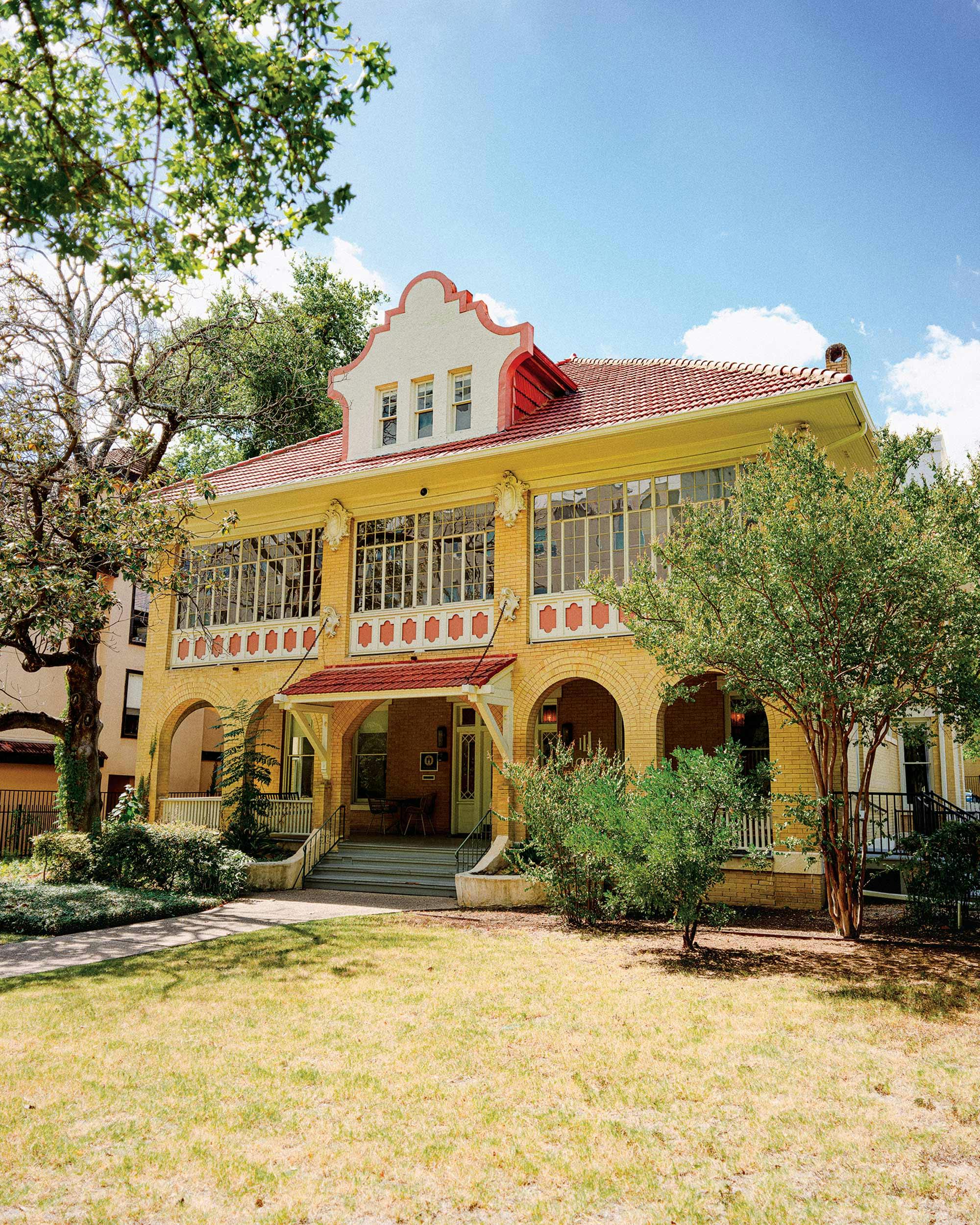
 The Cicero Institute.Photograph by Chad Wadsworth
The Cicero Institute.Photograph by Chad Wadsworth
Among the guests were 23andMe cofounder Linda Avey; Chris Bosh, the Dallas native and NBA Hall of Famer now living in the Austin area; and journalist Sewell Chan, then the editor of The Texas Tribune. “And then it was like a clown car of twenty or twenty-five VC guys, Tesla guys, tech-med guys,” one guest, an Austin fixture, told me. Not much was settled about the end of civilization, except that Luke Nosek and many of his guests seemed to think it was coming soon. “Basically, all of those guys were like, ‘We need to burn it down,’ ” the guest told me. That decided, the party broke up. “We had to be out of the house by eleven because Elon was coming.”
Of all the newcomers, Lonsdale seemed the most intent on publicly persuading Austin to see itself differently. He would lead by example—show the city a new value system (or a classic Texas one) where money talks, and lots of money talks even louder. Lonsdale was, after all, an extremely successful businessman. When he came to Austin, he was running the technology investment firm 8VC, which had more than $6 billion from committed investors as of 2023. Lonsdale had also cofounded OpenGov, a software firm that served government agencies. Raised by his Jewish mother, he often references a variation on the Hebrew dictum tikkun olam (“to repair and heal”), which he has interpreted as “the world is broken; let’s fix it.”
He moved his wife and six children into a 15,000-square-foot house with eleven bedrooms and eleven baths that resembles a Norman castle. He kept up his regular, business-oriented appearances on CNBC and the like and conducted interviews on his YouTube channel. Broadcasting from a wood-paneled, book-lined library with a large marble fireplace to some 70,000 subscribers, he’s chatted with Thiel, techno-nationalist Alex Karp, and right-wing megadonor Charles Koch. Lonsdale also brought to Austin the Cicero Institute, the think tank he founded in 2016 to super-spread his ideas, as in his anti-left blog post “How to Dismantle the NGO Underground.”
But he also arrived in Austin with newer, bigger plans. Lonsdale conceived of the idea for the University of Austin in 2021 along with Bari Weiss, the right-of-center journalist who founded The Free Press and now is editor in chief of CBS News, and the British American historian Niall Ferguson, a vociferous critic of the “illiberal monoculture” in higher education. Lonsdale founded the school in 2022 with his own $25 million–plus, plopping it smack in the middle of downtown in the old Scarbrough’s department store. In a welcome video on the website, Governor Greg Abbott appears with UATX kids inside the Capitol, students cavort in Lonsdale’s backyard, and others convene at Arena Hall. Another Sunfish-size cheese board does a cameo.
“Universities have been captured by new ideologies of intolerance that order subservience and quash those who think differently,” Lonsdale wrote, announcing the creation of UATX. His desire, he said, was for open debate, for boldness, for new ideas to solve old problems. “We are challenging a jealous orthodoxy and expect to be scorned, mocked and even viciously attacked.”
Soon enough, he was.
It must have been something of a shock when Lonsdale got to Austin and saw the city’s homeless population clogging intersections and sleeping on downtown benches in numbers similar to those in California, where in the early aughts the subprime-mortgage crisis consigned so many people to the streets. “I guess the mayor [of Austin] was very progressive, and he went to San Francisco and L.A., and he copied some of their policies,” Lonsdale mused on his YouTube show in 2022. “I believe he was told to show people capitalism doesn’t work and put it in their faces.” (“I’ve never said capitalism doesn’t work, ” Steve Adler, Austin’s mayor from 2015 to 2023, told me. “And I went to San Francisco and L.A. to learn what not to do, not to copy what they were doing.”)
For much of its recent history, Austin had responded to its homeless population with characteristic laissez-faire. A camping ban became law in 1996 by one city council vote, after which journalist Molly Ivins and singer Steven Fromholz spent a night sleeping on Congress Avenue with other protesters and those who were actually homeless. The ban was pretty much doomed from the start—no one showed up in court to pay fines associated with their tickets. “How could you give somebody who’s homeless a five-hundred-dollar ticket?” Ivins asked. “If they had that, they wouldn’t be homeless.”
In 2019 a lefty city council, at the urging of Councilman (now Congressman) Greg Casar, voted to repeal the ban formally. “We can house people,” Casar told a reporter. “We can serve people. We can address the core issues. We can improve all of our safety, rather than perpetuating instability and insecurity.” It was an article of faith among local liberals that criminalizing the homeless was inhumane and created danger for those living on the streets, forcing them to live in dire locales, like creek beds and storm drains. In addition, the criminal records that resulted from ticketing made it even more difficult for people to find a place to live or a job. As long as there was no “aggressive confrontation,” the council decided, panhandling was okay, as was camping under freeway underpasses and on sidewalks.
The Austin Church Targeted by Ken Paxton for Helping the Homeless
The silver-haired, soft-spoken Adler also asserted, in that idealistic Austin way, that allowing the homeless to become more visible might make the public more inclined to support the building of shelters, affordable housing, and other support systems the city was lacking.
This did not happen to any substantial degree. Today, on one of Austin’s most important streets, Congress Avenue, substantial numbers of homeless people occupy benches and sleep on the sidewalks. Beloved businesses like Royal Blue Grocery have closed because of assaults on employees and persistent shoplifting.
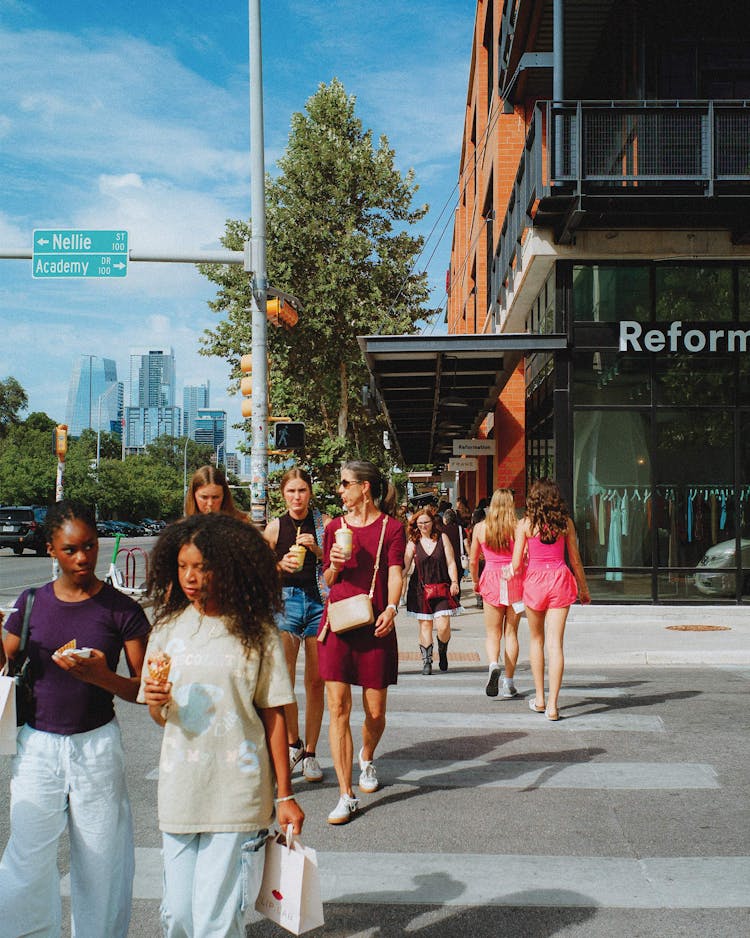 Shoppers on South Congress Avenue. Photograph by Chad Wadsworth
Shoppers on South Congress Avenue. Photograph by Chad Wadsworth 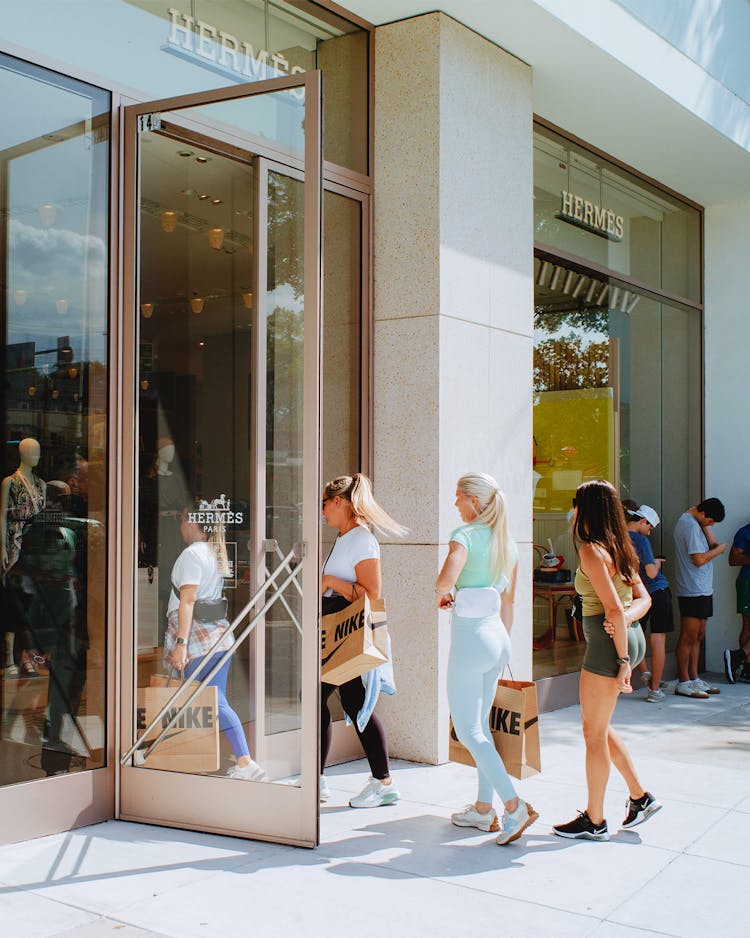 South Congress Avenue. Photograph by Chad Wadsworth
South Congress Avenue. Photograph by Chad Wadsworth
Frustrated by so-dubbed Spendthrift Steve, Republican legislator Bryan Slayton, from Royse City, once proposed designating a section of Interstate 35 that abuts downtown the Steve Adler Public Restroom Highway. For years, though, Republicans couldn’t get beyond the name-calling. The blue-eyed, baby-faced political operative and Travis County GOP chair Matt Mackowiak, for one, had agitated fruitlessly for years against Adler, who, he told me recently, was the “worst mayor in the history of Austin, and it’s actually not even close.” He added: “We’re still trying to rescue our city from that damage. I blame him and Casar personally.”
In 2019 a fed-up Mackowiak founded Save Austin Now, a political advocacy group determined to reinstate the camping ban. Mackowiak asserted that the existing homelessness policy was itself cruel, because it failed to help people get back on their feet.
At the time, plenty of Austin liberals dismissed him. The first time Mackowiak tried to get the camping ban on the ballot, city officials determined that Save Austin Now’s petition contained duplicate signatures and out-of-city signers, which got it thrown off. Mackowiak then scrambled to get it on the ballot for a special election in 2021.
This time, however, the cavalry showed up. It turned out that a number of local businessmen thought something had to be done—Whole Foods founder John Mackey, King of the Hill creator Mike Judge, and even Adler’s law partner, Michael Barron, contributed to the cause. But more to the point, a new class of donors in town showered Save Austin Now with $1.9 million—the second-highest amount ever raised for a candidate or measure in an Austin city election. Lonsdale chipped in $40,000, quite a lot for a local skirmish.
You would have thought Save Austin Now was trying to resurrect Armadillo World Headquarters, the legendary local music venue; according to Texas Ethics Commission records, the group spent $1.6 million on advertising and $800,000 on direct contact including door-to-door canvassing. Ironically, locals complained about hordes of Save Austin Now workers dogging them on city streets for signatures. Like panhandlers.
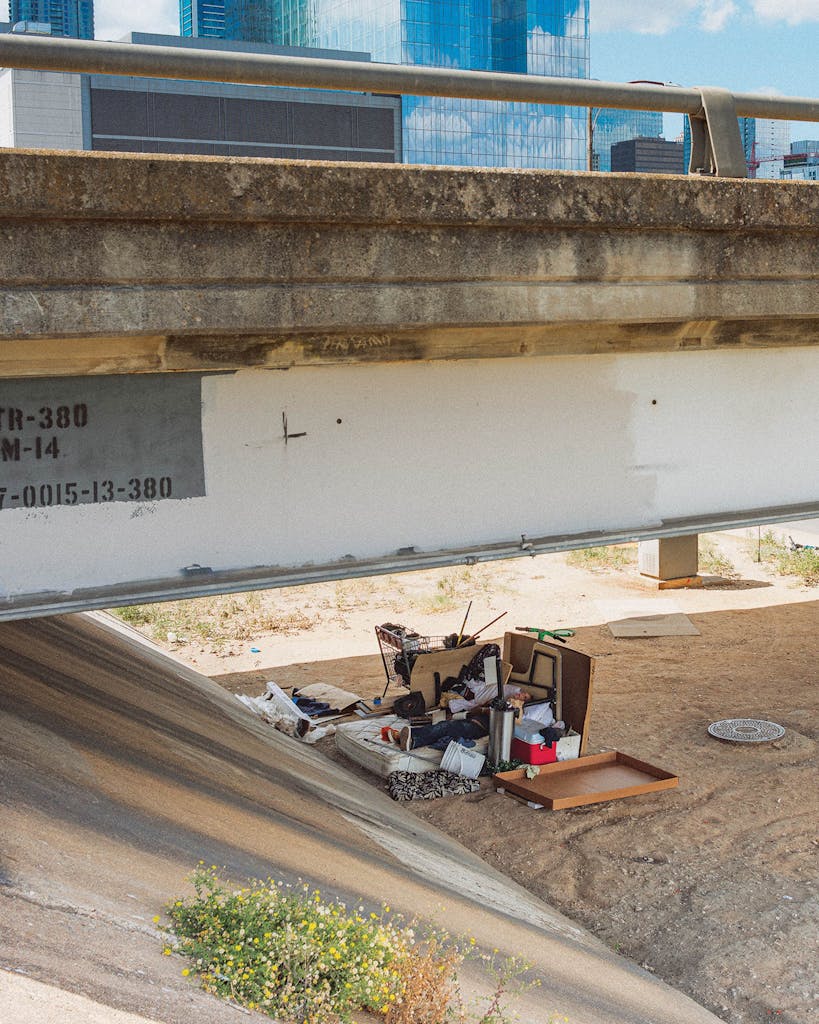
 A homeless camp under Interstate 35 in downtown Austin on September 22, 2025. Photograph by Chad Wadsworth
A homeless camp under Interstate 35 in downtown Austin on September 22, 2025. Photograph by Chad Wadsworth
Lonsdale shaped the campaign with far more than cash, as Save Austin Now used Cicero’s talking points and research to orient its marketing efforts. In May 2021, Proposition B, a camping ban, passed by a margin of 57 percent to 42 percent. For Lonsdale, Austin’s homeless fight served as market testing for a much larger campaign. The Legislature used Cicero’s bill templates to craft a statewide camping ban that was passed three weeks after Prop B and that Abbott swiftly signed into law. Meanwhile, the homeless encampments under I-35 were razed.
“We did two things,” Lonsdale told me. “One, we got people in Austin to vote against their own city council, and two was we passed the law at the state level.”
It was an early if not widely noted example of Lonsdale’s influence. Faced with city-government opposition, he and other Prop B bigwigs found backup at the Capitol. “The people who run the Legislature are very interested to meet me, and they take notes,” Lonsdale told me of his meetings there. “And we debate. . . . They don’t agree with me on everything, but they are respectful. And we get laws passed; we’ve gotten a lot of laws passed.”
Cicero’s work has since been used as a model by other states—versions of the Texas bill have been introduced in legislatures in Arizona, Kansas, Oklahoma, and Wisconsin, and have passed in Georgia, Missouri, Tennessee, and Utah. These laws favor mandatory treatment and/or jail time over what Cicero disparages as “free” (they’re really subsidized) housing and voluntary mental health and addiction treatment. Clearing the streets, in this model, requires data-driven surveillance and expanded incarceration facilities—services, perhaps not coincidentally, offered by some of Lonsdale’s 8VC clients.
In one interview from his library bunker, Lonsdale expounded on his philosophy. “You say, ‘I’m sorry, we’re not gonna put you in prison because we are not jerks,’ ” Lonsdale explained to an interviewer of his approach to those repeatedly getting ticketed. “But we are going to put you in forced treatment.”
“Which is also kind of like prison, right?” a reporter countered.
“It is,” Lonsdale said.
Hooked on a Thiel-ing
Elon Musk
PayPal CEO until ousted by Thiel. Founder of SpaceX and Starlink and CEO of Tesla. Former DOGE ringleader. Briefly deposed by Larry Ellison as the richest person in the world but back on top. He built an Austin compound reportedly to house some of his ex-wives and children.
Ken Howery
PayPal and Founders Fund cofounder; Clarium Capital VP. Trump ambassador to Sweden 2019–2021. Musk bunked as a guest at his lakeside mansion while reportedly house hunting in Austin in 2020. Graduate of J. Frank Dobie High School, in Houston.
Joe Gebbia
Cofounder of Airbnb, Tesla board member, Musk pal, DOGE superstar, and first-ever U.S. chief design officer. Declared his allegiance to Trump on X in January 2025 after a “woke-up call.” Has lived in Austin since 2020. Big on therapeutic sound baths.
Luke Nosek
PayPal and Founders Fund cofounder with Thiel and Howery and founder of the Gigafund venture capital firm (which invests in SpaceX, Neuralink, and the Boring Company). Like Thiel, was once registered to be cryogenically frozen and defrosted in the future. Married to . . .
Nicole Nosek
Former Democratic campaign operative with expertise in communications. Created the bipartisan Texans for Reasonable Solutions, which successfully pushed the Legislature to allow more affordable housing across Texas.
Evan Baehr
Worked for Thiel at Clarium Capital and created Able Lending, a fintech company that Thiel invested in. Founded Arena Hall, a membership club, and the Teneo Network, a Federalist Society dupe established to expand conservative influence in the private sector.
Flush with victory, members of the wealthy California contingent, along with a passel of no-longer-lonely local conservatives, moved on to a new fight. Broadly, the issue was crime, which had spiked during the pandemic, as it had in most other large American cities. Just how bad Austin’s crime problem was, however, would become a subject of intense debate.
Overall, the number of incidents reported to the police each year had been trending downward since 2009. But violent crime started rising in 2019 and peaked in 2022 (it has subsequently declined). Property crimes, like car theft, also ticked up slightly in 2022, and the rate was higher than in cities of comparable size. Then, too, the homeless population was still very visible—there were few spots for the economically displaced to go—and sometimes more frightening as fentanyl made its way to town. Even so, according to FBI Uniform Crime Reporting data for 2020, Austin’s violent-crime rate was significantly lower than the average for large U.S. cities.
Despite the statistics, some conservative business leaders and California émigrés were certain the city was becoming as lawless and chaotic as San Francisco. Or they saw an opportunity for political gain by jumping on the tough-on-crime bandwagon that had been embraced nationally by the right.
The local battle began, as it did across the country, in response to the 2020 murder of George Floyd by a Minneapolis police officer. Protesters took to the streets, demanding changes at the Austin Police Department, particularly regarding its treatment of minorities. Austin’s left-leaning city council, in response, transferred a substantial chunk of its law enforcement budget toward social services, hoping to make Austin a model for other cities trying to improve treatment of minority residents. “This moment has been born out of a lot of hurt in the community,” Casar said at a council meeting, causing apoplexy among law-and-order types.
The Republican-dominated Legislature and the governor pounced. Never one to miss a lib-bashing opportunity, Abbott called the council’s actions reckless and downright dangerous. Attorney General Ken Paxton chimed in, labeling the city council’s move “a political haymaker driven by the pressures of cancel culture.”
In June 2021, backed by a battalion of state legislators and law enforcement officers, a gleeful Abbott signed several “Back the Blue” bills into law that (once again) punished Texas’s biggest cities, especially Austin. This time, if any city cut police spending, the state would deduct an equal amount from its sales-tax-revenue distributions to fund state cops and would freeze property tax revenue. Another law made it a felony for protesters to block highway traffic, as many had done during Black Lives Matter marches. A third measure made it a felony to distract a police officer with a laser pointer.
Subsequently, the city council capitulated and restored the cuts it had made to the APD. But a contingent of local conservatives and tech moguls wanted more. In 2023 the group, led again by Mackowiak, launched a new Save Austin Now initiative to attack what it claimed was Austin’s exploding crime problem.
Lonsdale told me that there was a need at the time for opposition to local government, because “otherwise the city gets captured by the grifting interests, and it defunds police and it brings more [of the NGOs that help the homeless] in the wrong way, and you have more crime.”
Save Austin Now centered on a target: district attorney José Garza, whom it saw as perilously and capriciously soft on crime. Lonsdale regards Garza as part of a larger problem: He told me that the “far left are doing something very dangerous all over our country. And I think Texas is very naive to that so far, because they haven’t dealt with it as much as we have where I come from.”
You could say the soft-voiced Garza, who favors algebra-teacher glasses and a Vandyke-beard-and-mustache combo, appeared vulnerable to Lonsdale’s and Save Austin Now’s accusations. A reformer, he had been the executive director of the Workers Defense Project from 2015 to 2021 and was a proud member of the Democratic Socialists of America; Garza’s first race for district attorney had been funded in part by George Soros’s Open Society Foundations network. (As Peter Thiel is to the left, Soros is to the right—the equivalent of Hannibal Lecter.) In his first term as DA, Garza fought to end low-level drug prosecutions, earned the enmity of the Austin police for his largely unsuccessful attempts to prosecute alleged abuses within the department, and—even worse—championed bail reform. As time went on, Garza also developed a reputation for failing to prosecute violent crimes that were not committed by police officers.
Save Austin Now found a more-than-welcoming statehouse in its effort to dispatch Travis County’s district attorney. State Representative David Cook, a Republican from Mansfield, introduced a bill allowing for the Legislature to impeach any DA for misconduct—that is, if he or she isn’t vigilant about prosecuting certain crimes, including low-level thefts as well as abortion and voter fraud. The bill passed and became law. Save Austin Now also helped launch a website in September called Garzawatch, where crime victims could share their stories. Whistleblowers were invited to contact the site to rat out any abuses or legal violations in the DA’s office.
As Garza announced a bid for reelection in 2023, Save Austin Now began beating the bushes for a candidate to oppose him. The candidate had to be a Democrat, of course, because a Republican would have been a nonstarter in Austin.
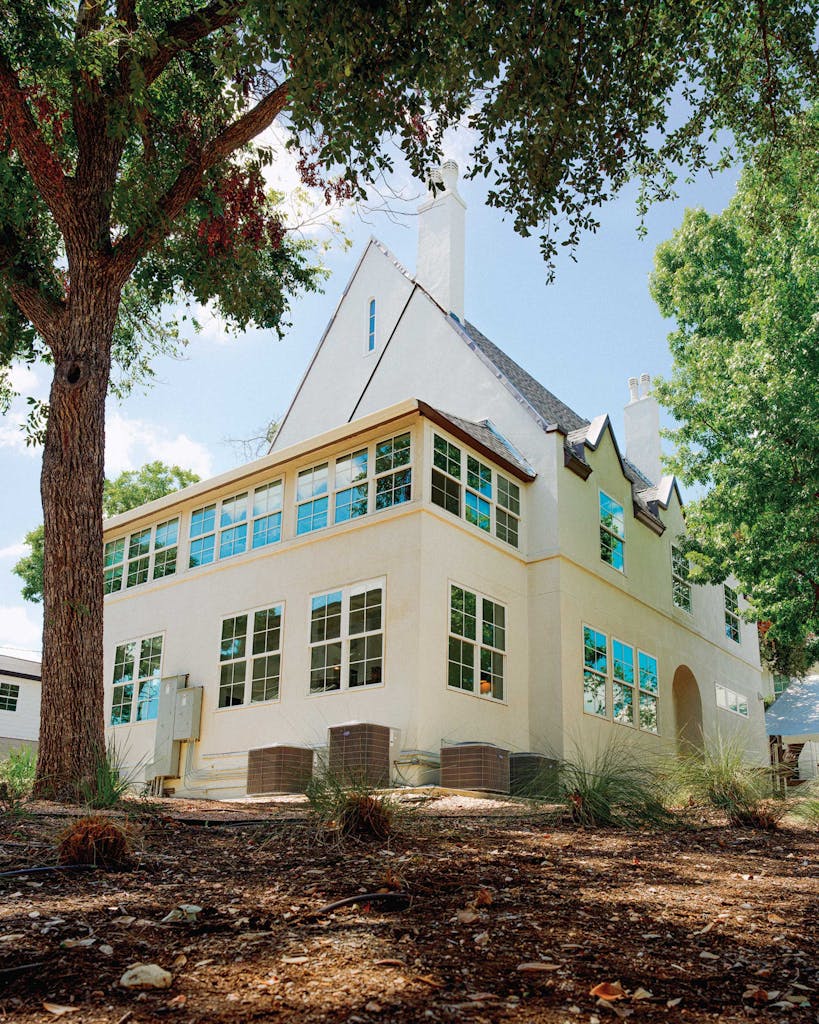
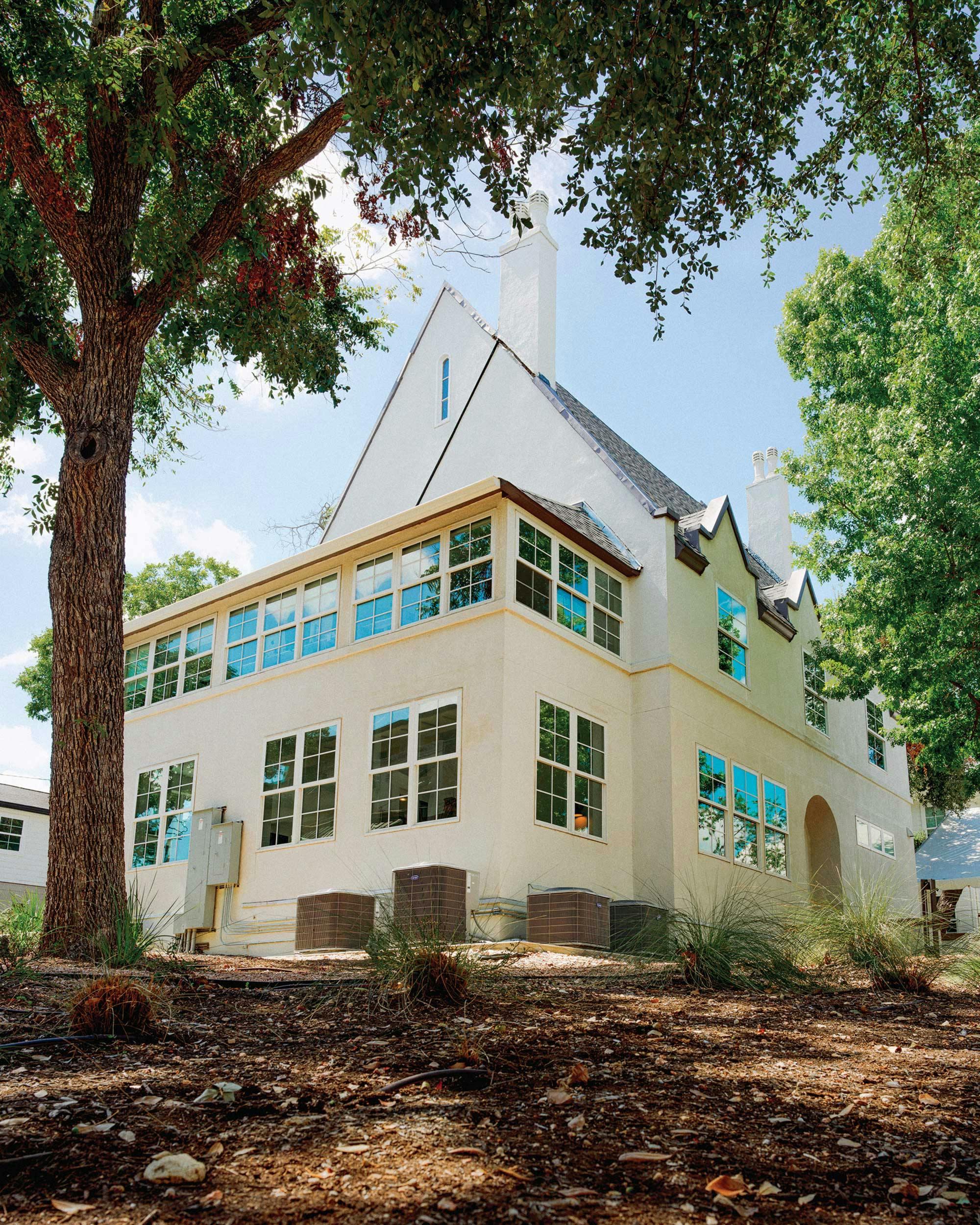 The exterior of Arena Hall.Photograph by Chad Wadsworth
The exterior of Arena Hall.Photograph by Chad Wadsworth
It must not have been easy. Jeremy Sylestine signed on the last day of the filing deadline, December 11, 2023. With bright eyes and dark hair, Sylestine might have looked great on paper: He was a member of the Alabama-
Coushatta tribe from East Texas, and he was a graduate of UT-Austin and the University of Virginia law school. Sylestine had also been a prosecutor in the Travis County DA’s office for fifteen years but left as Garza arrived, saying (when he announced his run) that the office had been “headed in the wrong direction.” With the primary set for March 5, there wasn’t much time for Save Austin Now to save Austin.
Thanks to its prosperous donor group, though, Sylestine was well funded; he raised $250,000 in January alone, a hefty sum for a local DA’s race. In total, Kind Snacks founder Daniel Lubetzky chipped in $160,000; the estate of Majid Hemmasi, an Austin businessman who was murdered in 2017, three years before Garza first took office, contributed $100,000; and Lonsdale forked over $25,000.
Within the first two months of 2024, Austin became a battlefield—an ugly, political, and very expensive battlefield. You could say that Save Austin Now took the high road, enjoying the support of the police union and pummeling Garza for being weak on crime while encouraging Republicans to hold their noses and cross party lines to vote for Sylestine. The Free Press, edited by Lonsdale pal Bari Weiss, published a story whose headline asked, “In a Deep-Blue City, Will Locals Get Tough on Crime?” (“Crime in Austin has soared under a progressive district attorney . . .”)
Meanwhile, a new group called Saving Austin—why the names seemed so similar is a mystery—went low. The then-unidentified dark money PAC barraged the populace with flyers, emails, and TV commercials. The most infamous was a mailer that featured a bloodied teddy bear and the caption “Jose Garza Is Filling Austin’s Streets With Pedophiles & Killers.” It reminded residents that the “next victim could be your loved one” and urged them to demand that Garza “stop cutting plea deals with these monsters.”
In turn, Sylestine raced to distance himself from exploding public outrage over what was then believed to be his campaign’s scare tactics. “I want to make unequivocally clear that I, and my campaign, denounce the demagogic mailer by the so-called Saving Austin PAC attacking José Garza,” Sylestine declared on social media on March 1, while the teddy bear flyer was going viral. “That extreme rhetoric and imagery should have no place in this race.” You had the feeling that Sylestine might be regretting his decision to run.
Later that same day, an outraged Team Garza issued a cease and desist order declaring that the flyer violated Texas election laws by not disclosing who had paid for it. As Mimi Marziani, a lawyer for the firm representing the campaign, announced, the document was “cowardly, misleading and divisive.” She threatened legal action. In fact, the PAC had not registered with the Texas Ethics Commission or the secretary of state, which not only made it illegal but made its origins hard to trace. As was frequently noted by a mystified press at the time, the address on the flyer turned out to be a UPS store in Irving, 205 miles to the north. Months later, The Wall Street Journal would report that Elon Musk had funded the group.
Austin went to the polls just a few days later and summarily rejected Sylestine and the $1.3 million his backers had spent on the race. They might as well have set their cash on fire: Garza trounced his opponent by a two-to-one margin. “This community didn’t take the bait,” Garza told his supporters triumphantly at his victory party.
The Save Austin Now contingent was nothing if not determined. They kept looking for ways to depose Garza even as spring turned to summer and the November election loomed. Garza’s Republican opponent, a proud criminal defense attorney, wasn’t generating any enthusiasm. But then hope arrived in the form of a woman named Betsy Dupuis.
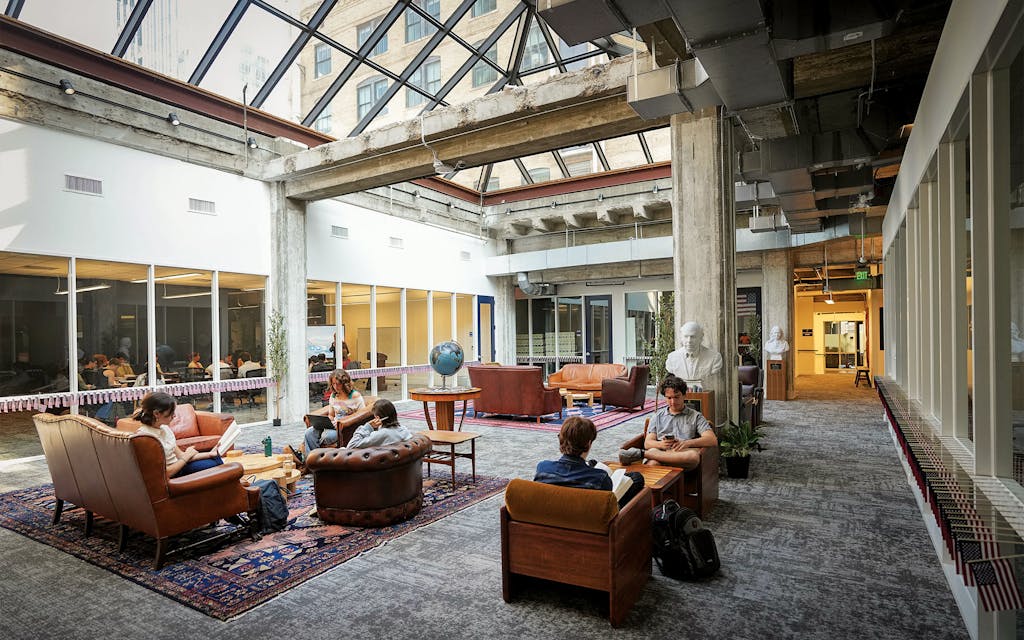
 Students in a common area at the University of Austin.Jay Janner/The Austin American-Statesman via Getty
Students in a common area at the University of Austin.Jay Janner/The Austin American-Statesman via Getty
Dupuis was in her mid-thirties, with brown eyes, long sable-hued hair, and a soft, round face that could, on first meeting, suggest she had an accommodating personality.
Dupuis knew her way around Austin’s tech community. She had worked as a software designer at an Austin company called New Knowledge (now Yonder), a controversial, NSA-linked cybersecurity firm that specialized in ferreting out disinformation, including Russian interference in the 2016 election. Dupuis had once leaned libertarian but jokes that she is now “a pragmatic anarchist with positions that would upset both parties.” She finds the progressive left “totalitarian.”
Dupuis is also someone for whom trawling the internet was a lot more than a pastime; her research skills matched those of a grizzled CIA analyst. All told, Dupuis has the classic whistleblower’s personality—sharp, relentless, and prickly. She’s never met a document or text message she didn’t squirrel away for possible use at a later date.
Before the pandemic, Dupuis dated a wealthy tech entrepreneur. Their months-long relationship eventually deteriorated into a toxic stew of recriminations and abuse: “I wasn’t ever going to date you long term,” her ex wrote in a text message. “Because you are pathetic and I’m top 1%.” The relationship ended in 2019 with what Dupuis considered a sexual assault and her former partner defined as consensual sex.
Except that the relationship didn’t end. In the years that followed, Dupuis’s ex’s father reported her to the police for harassment, and her ex sued her for defamation after she posted his texts on Twitter. During a hearing in that case, Dupuis learned that her former lover faced a warrant for his arrest on charges of assaulting another woman (he ultimately received a conditional dismissal of the charges, having “completed treatment”). Dupuis hired a lawyer and countersued, accusing her ex in civil court of sexual assault.
With knowledge of the prior accusation and on her lawyer’s advice—he told her it would help her case—Dupuis went to APD and filed a police report. She waited. But in early 2023, Dupuis learned that the DA’s office would not file charges. She said she was told that she couldn’t prove the encounter was not consensual and hadn’t made an “outcry”—in other words told anyone else what had happened. Dupuis said she had. (Garza did not respond to questions about why his office did not pursue charges.)
Then Dupuis went nuclear. She consulted another attorney, Martin Harry, who had also been Garza’s opponent in 2020. Using the law passed by the Legislature that Save Austin Now had pushed for to punish progressive prosecutors, she filed a petition in April 2024 asking for Garza’s removal “due to incompetency and official misconduct.”
Democrats, Garza included, took to the media to label Dupuis a MAGA plant. Matt Mackowiak, however, saw an opportunity. He contacted her, hoping to enlist her in the fight to stop Garza.
The two fell out relatively quickly. They disagreed over how a Mackowiak-
arranged TV news segment proceeded and over the language in an anti-Garza press release. Mackowiak said it was necessary to edit the statement. Dupuis didn’t like someone putting words in her mouth.
But other anti-Garza types did not give up on her. Another Garza nonfan by the name of Chad Grills—podcaster, entrepreneur, Army infantry veteran, self-help author, and a beneficiary of Thiel’s venture capital Founders Fund—invited her to a meeting at Arena Hall. Dupuis accepted. She was curious, she told me.
The subject line for the event invitation was “Rebuilding Austin.” A decidedly cryptic note below promised “a private briefing and discussion around what’s happening in Austin and Travis County.” In attendance were, among others, James P. Sullivan, Greg Abbott’s general counsel, who would be appointed to the state Supreme Court in January 2025, and a woman who had worked on a documentary, Riding the Dragon, about Hunter Biden’s dealings in China. On the invite list was Cody Wilson, the founder of Austin-based Defense Distributed, a company that produced a so-called ghost gun that could be purchased online and made with a 3D printer, and a Lonsdale-adjacent former Palantir and 8VC employee who was now a “talent network manager” for the University of Austin.
At the event, the Arena Hall founder himself, Evan Baehr, greeted Dupuis with “Welcome to the team.” But over the next hour or so, Dupuis did not feel welcome. At one point a guest jokingly referred to her as a conspiracy theorist and suggested a real researcher take a look at the opposition research on Garza that she had done on her own.
The guest’s name was Andrew Beck. He is the cofounder of Beck & Stone, a far-right, anti-woke political and brand consultancy with links to male-only private investment clubs and the Claremont Institute, which championed Project 2025, the right-wing political initiative to reshape the federal government that has been adopted by Donald Trump. Beck has called for “a showdown on Mount Carmel, with all the people gathered to see Christian civilization and secular atheist civilization confront one another as opposing ways of life.” On his company website, he describes himself as someone who “helped put intellectual conservatism and dissident thought on the map in the rapidly evolving public square of the internet” and notes that “his work is widely emulated and his input highly valued by decision makers.” Dupuis recalled that at the Arena Hall meeting, “he kept saying he was going to turn Travis County red.”
After the event, Beck and Dupuis began a correspondence. She sent me a twelve-page, single-spaced compilation of the 22 email messages they exchanged. “I do not appreciate the condescending and disrespectful commentary about my activism, research, and the horror story I have been living through that has pushed me to fight for change in Travis County,” her first email began. As for his challenge of her bona fides, “I am a researcher that has researched the research of researchers to help researchers do better research,” she wrote.
Beck tried desperately to apologize—“Hey Betsy, sorry to hear this!”—but he was doomed. After several additional lengthy and increasingly angry emails from Dupuis, he asked her “politely” to “stop communicating with me and about me.”
In the end, Beck and the rest of the Arena Hall gang did not succeed in turning Austin red. Garza won the November general election by almost the identical percentage as he had the blistering March primary and the 2020 general. A month or so later, a judge dismissed Dupuis’s recall petition against Garza.
After the election, Steve Adler suggested that Baehr and Garza break bread. “The conversation was eye-opening,” Baehr told me. “I realized we actually share goals” concerning public safety and “paths to healing for those in extreme addiction.” He invited Garza to Arena Hall to lead an innovation workshop on public safety, telling me, “This city is too small and its future too important to fight our battles through political campaign ads.”
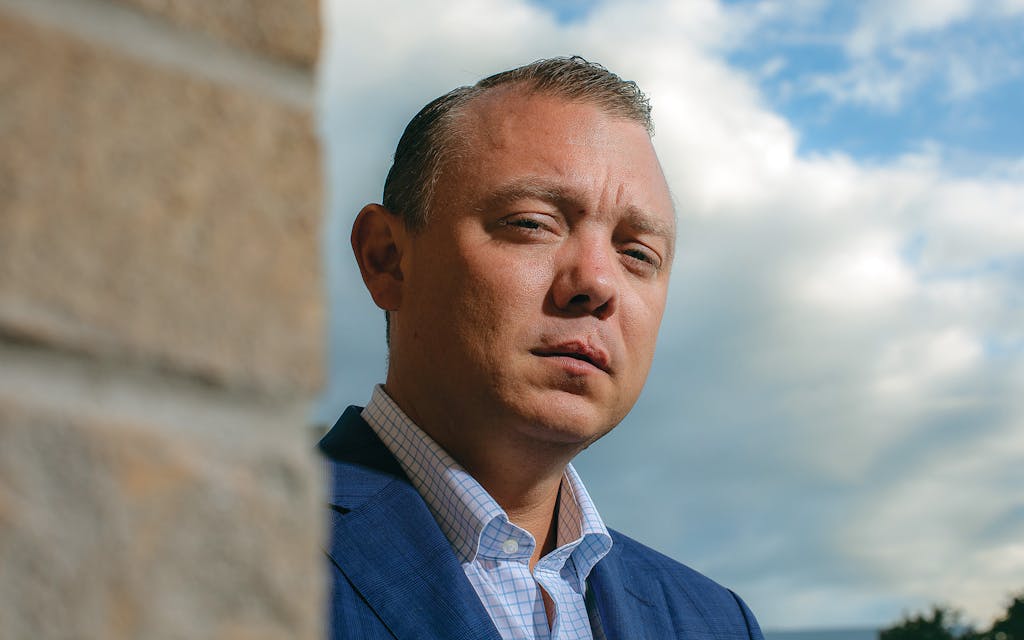
 Matt Mackowiak at the Austin Police Department headquarters in 2021.Marshall Tidrick
Matt Mackowiak at the Austin Police Department headquarters in 2021.Marshall Tidrick
When we spoke, Lonsdale did not sound like a man close to surrender. He was on his way to give a speech at the Reagan library, in Southern California, and he sounded even more rushed than usual. His words tumbled out as if spilled from some incomprehensible altitude. He wanted to preserve Austin’s culture. He wanted to make the city more affordable for the working class and the middle class. He just wished the local leadership were more “functional.”
He went on. The city’s policies really just drive him crazy, he said, because he loves Austin and doesn’t want to see it destroyed by virtue signalers, nonprofit grifters, corrupt politicians, and “a lot of the people around them who are very naive and who don’t realize what’s happening.”
“This is what happened in Silicon Valley,” he continued. “You had all this wealth come in, but then you had all these very corrupt, very ideological leaders in these cities, and they stole a lot of wealth and broke things and made it terrible for the working class. And so I really don’t want that to happen in Austin.”
How to make it more “centrist and rational?” That was the key question.
“It would be great,” he said, “if we could figure that out.”
Lifestyles of the Austin Rich and Not So Famous
But with the influence of its booming tech sector, Austin has become as status obsessed as the Texas cities it’s historically dissed. Now the town is awash in private clubs, from the pricey, sybaritic Soho House to the far more earnest (and political) Arena Hall. South Congress, once Austin’s funkiest hood, has been unsuccessfully rebranded as “SoCo” and feels like a lifestyle-training ground for budding moguls. It features the infamous Hermès store, where the brand’s version of a Frisbee—in orange, conveniently similar to UT’s favorite shade—sells for $265.
But craving the riches of Silicon Valley expats isn’t the same as having those riches. As a local wealth manager with several tech clients explained to me, “there’s a difference between people showing up and bringing wealth with them and people making wealth who live in Austin.” A prospective client might live in a $5 million house, have a boat on Lake Travis, own three cars, “and only have $250,000 in savings.”
Based on the number of Silicon Valley–style self-help gurus now here, this new moneyed class also needs assistance managing human capital. “Austin has become a permanent outpost for the techno-spiritual ecosystem,” said sexologist Coral Osborne, who added that many of the newcomers she works with exhibit “self-serving delusion masked as radical honesty.”
Fortunately, a host of start-ups and lifestyle consultants in town offer transplants help reconnecting with their humanity. Judson Kauffman, a “transformational coach” with clients in the tech and VC sectors, said many folks come to him because they “don’t understand the meaning of life. They don’t understand what their purpose is. They don’t exude love.”
This article originally appeared in the November 2025 issue of Texas Monthly with the headline “Austin’s Red Scare.” Subscribe today.
Clarification: This article was updated on October 28, 2025, to note that Luke Nosek is no longer registered to be cryogenically frozen.
When you buy a book using a link on this page, a portion of your purchase goes to independent bookstores and Texas Monthly receives a commission. Thank you for supporting our journalism.
Read Next

